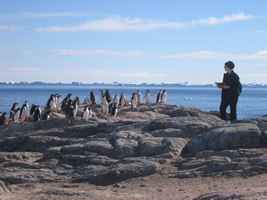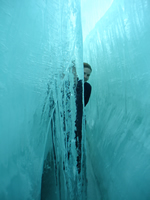|
Where did you grow up?
I grew up in Adelaide, where my family was into bushwalking. However, I forgot about the bush when I was a teenager, with sailing and the city taking my time. The smell of the gum trees and dust must have somehow got under my skin though, because when I left home, I got back into walking and rock climbing as excuses to get back out into the natural world.
What subjects did you enjoy at school?
At school, I enjoyed biology, but somehow got the idea that the only research being done in biology involved the chemistry of photosynthesis and other cell processes. I thought this meant that to be a biologist I would have to study chemistry and and spend my time conducting repetitive lab experiments - not my cup of tea.
How does a journalist become a scientist?
I went to uni and studied to become a journalist. I worked for the ABC in country Victoria for four years, before I decided to go back to uni to study environmental issues so I could become an environment reporter. The environment had become more and more important to me while I was living near the Grampians in Western Victoria. At the University of Tasmania, however, I got sidetracked and ended up in Antarctica studying penguins. I suddenly discovered that science could be used an excuse to go out to amazing places and see some of the most intense sights in the world. I've since discovered that while science - at least the way I do it - still involves statistics, I haven't had to spend any time in a lab at all. I still work as a reporter to pay my way through my Masters degree.
What does your current research involve?
I'm trying to work out why Adelie penguins choose some places over others when they're nesting. Adelies are black and white penguins that nest in ice-free areas of the Antarctic coastlines. At Casey Station, where I did my fieldwork, they form colonies of up 1600 breeding pairs. I'm using a computer model to find out whether the shape of the ground can predict the location of colonies and population changes in those colonies.
Last summer, I spent four months at Casey Station, watching the penguin chicks hatch out of their eggs and grow until they fledged. Before I arrived, other people counted the number of pairs of birds nesting in each of the colonies, and I then counted how many chicks survived to reach the creche stage. This is part of a project that's been running for 50 years to chart changes in Adelie penguin populations around Casey. I also mapped all the colonies using a differential GPS unit. On top of the work for my project, I counted endangered giant petrels on some islands 16km offshore, monitored snow petrel chicks as they grew up, mapped storm-petrels, and observed seabirds at sea for other projects.
 On my way home, I spent a week hiking around Macquarie Island - an island in the middle of the Southern Ocean - helping to measure, collect and map plants for other people's projects. Macquarie Island is like south-west Tassie would be if you had to dodge penguins outside your house, and shut the gates to make sure elephant seals don't get into the garden.
On my way home, I spent a week hiking around Macquarie Island - an island in the middle of the Southern Ocean - helping to measure, collect and map plants for other people's projects. Macquarie Island is like south-west Tassie would be if you had to dodge penguins outside your house, and shut the gates to make sure elephant seals don't get into the garden.
What do you love about science?
I never imagined I'd get to see the places I've been to-, let alone to live in them - to be blasted by a blizzard, to snowboard on a hill looking over a bay full of killer whales, to watch a penguin chick struggle out of an egg, or be dive-bombed by a bird with a wing-span of more than a metre.
In lots of ways, science is a good excuse for me to get out in the natural world. But it's also a good excuse to be a nosy parker - kind of in the same way as journalism. As a journalist, I find things out by asking people. In science, I try to figure things out for myself.
|
